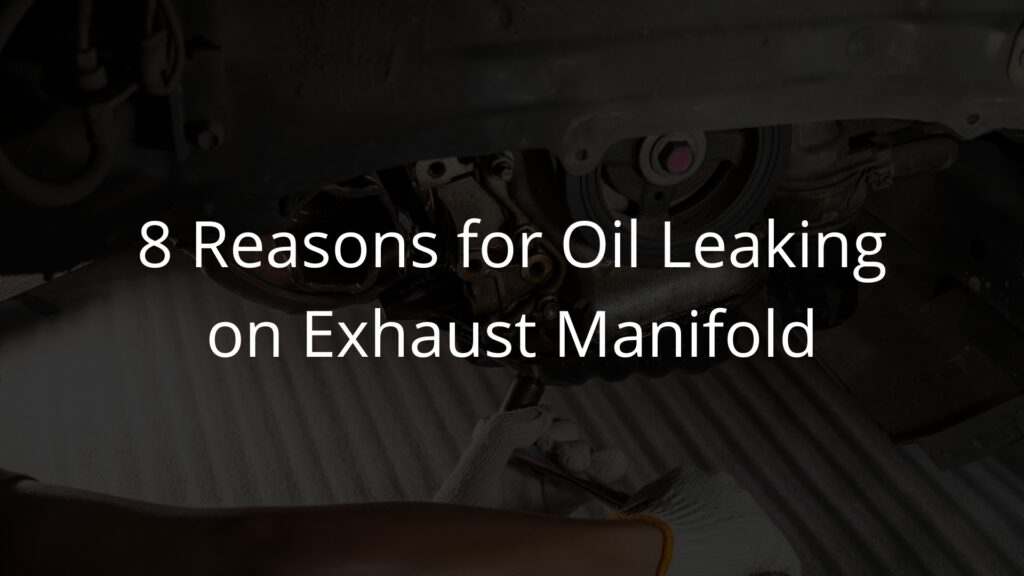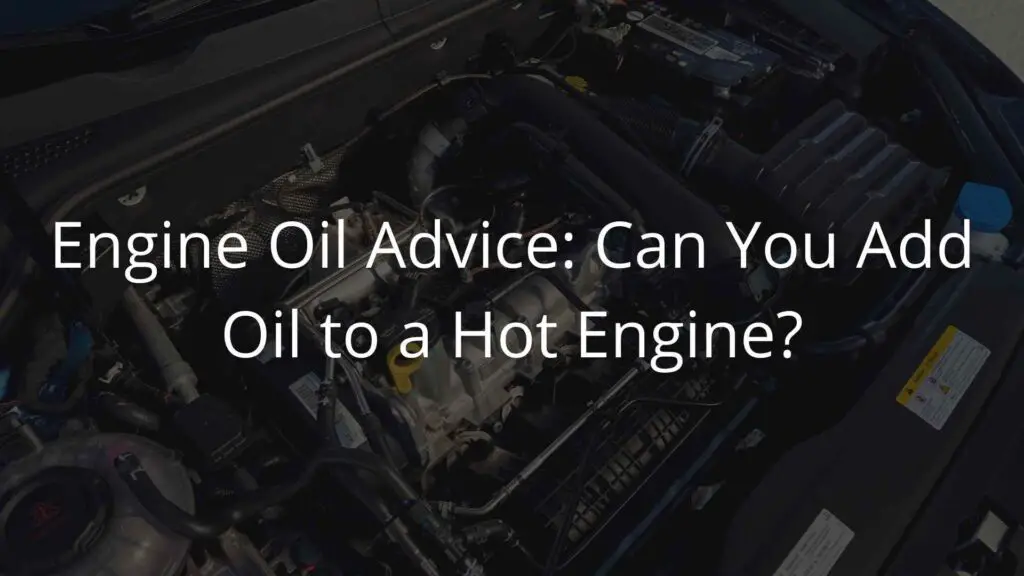Have you ever wondered why oil sometimes leaks onto the exhaust manifold of your vehicle? Well, you’re in the right place! In this discussion, we’ll explore the topic of “8 Reasons For Oil Leaking on Exhaust Manifold.”
We’ll dive into the various causes that can lead to this frustrating issue, such as worn gaskets, loose bolts, and cracked manifolds. So, let’s buckle up and uncover the reasons behind those pesky oil leaks on your exhaust manifold!
- What Is Exhaust Manifold? Can Engine Oil Leak Onto It?
- What Are the Symptoms of Oil Leaks on the Exhaust Manifold?
- What Are the Major Causes of Exhaust Manifold Oil Leaks?
- How To Fix an Exhaust Manifold Oil Leak?
- How To Avoid Exhaust Manifold Oil Leaks?
- Final Thoughts: 8 Reasons for Oil Leaking on Exhaust Manifold
- Frequently Asked Questions
What Is Exhaust Manifold? Can Engine Oil Leak Onto It?
The exhaust manifold is a component in the engine’s exhaust system that collects exhaust gases from the engine cylinders and directs them into the exhaust pipe. It is typically made of metal and is located near the engine block.
While engine oil does not flow directly through the exhaust manifold, oil leaks from various engine components, such as gaskets, seals, or valve covers, piston rings can occur. If an oil leak develops in the engine compartment, it is possible for the leaking oil to come into contact with the exhaust manifold, leading to the symptoms mentioned earlier, such as smoke, burning oil smell, and visible stains.

What Are the Symptoms of Oil Leaks on the Exhaust Manifold?
When there are oil leaks on the exhaust manifold of a vehicle, several symptoms may manifest. Here are some common symptoms to look out for:
1. Burning Oil Smell
A noticeable and persistent smell of burning oil may indicate an oil leak on the exhaust manifold. The leaking oil can come into contact with the hot exhaust components, leading to the distinct odor.
2. Smoke From the Engine Compartment
Oil dripping or splashing onto the hot exhaust manifold can result in visible smoke emanating from the engine compartment. This smoke may appear white or bluish in color and often accompanies the burning oil smell.

3. Oil Stains or Residue
Inspecting the engine compartment or underneath the vehicle may reveal oil stains or residue around the exhaust manifold. The leaking oil can leave noticeable marks, indicating a potential oil leak.
4. Decreased Oil Levels
Regularly monitoring the engine oil levels is crucial. If you notice a consistent decrease in oil levels without any visible leaks elsewhere, it could be an indication of an oil leak on the exhaust manifold.
5. Engine Performance Issues
Oil leaks on the exhaust manifold can have an adverse effect on engine performance. The leaking oil can interfere with the proper functioning of components, such as oxygen sensors or spark plugs, leading to rough idling, misfires, or reduced power.
6. Check Engine Light
In some cases, an oil leak on the exhaust manifold can trigger the vehicle’s onboard diagnostics system, causing the check engine light to illuminate. This is often accompanied by specific error codes related to engine performance or emissions.
What Are the Major Causes of Exhaust Manifold Oil Leaks?
Here are some major causes of oil leaks from the exhaust manifold:
1. Worn or Damaged Gaskets
The gaskets that seal the connections between the exhaust manifold and the engine block or cylinder head can deteriorate over time. This can result in oil leaks where the gaskets fail to create a proper seal, allowing oil to escape onto the exhaust manifold.
2. Loose or Faulty Bolts
The bolts that secure the exhaust manifold to the engine block or cylinder head can loosen over time due to engine vibrations or thermal cycling. Loose bolts can create gaps between the manifold and the mating surfaces, leading to oil leaks.
3. Cracked or Damaged Exhaust Manifold
Physical damage, such as cracks or fractures, in the exhaust manifold can provide pathways for oil to leak onto its surface. These cracks can occur due to excessive heat, thermal stress, or impact.

4. Valve Cover Gasket Failure
The valve cover gasket seals the valve cover to the cylinder head and prevents oil from leaking out. If the valve cover gasket becomes worn, damaged, or improperly installed, it can allow oil to leak onto the exhaust manifold.
5.Leaking Oil Pressure Sensor
The oil pressure sensor is responsible for monitoring oil pressure in the engine. If the sensor or its seal becomes faulty or damaged, it can result in an oil leak that may reach the exhaust manifold.
6.Crankshaft Seal Leak
The crankshaft seal prevents oil from escaping between the crankshaft and the engine block. If the seal wears out or becomes damaged, it can allow oil to leak and potentially reach the exhaust manifold.
7. Overfilled or Incorrectly Filled Oil
Overfilling the engine oil or using an incorrect type of oil can lead to increased oil pressure within the engine. Excessive pressure can cause oil to find its way past gaskets or seals, including those near the exhaust manifold.
8. Improper Installation or Maintenance
Poor installation of components, such as the exhaust manifold gasket or valve cover gasket, can result in improper sealing and subsequent oil leaks. Additionally, inadequate maintenance practices, such as infrequent oil changes or neglecting to check and replace worn gaskets, can contribute to oil leaks.
How To Fix an Exhaust Manifold Oil Leak?
Here are some common approaches to fixing an exhaust manifold oil leak:
1. Replace Gaskets
If the oil leak is originating from the gaskets, the first step is to remove the exhaust manifold. Clean the mating surfaces of the manifold and the engine block or cylinder head. Then, install new gaskets designed for your specific vehicle and torque the bolts to the manufacturer’s specifications.
2. Tighten or Replace Bolts
Check the bolts securing the exhaust manifold to the engine block or cylinder head. If they are loose, tighten them to the recommended torque. If any bolts are damaged or stripped, they should be replaced with new ones to ensure a secure and leak-free connection.
3. Repair or Replace Cracked Manifold
In the case of a cracked or damaged exhaust manifold, repair options may vary. Minor cracks can sometimes be repaired using high-temperature epoxy or sealing compounds specifically designed for exhaust systems. However, extensive or irreparable damage may require replacing the entire manifold with a new or refurbished one.
4. Check and Replace Valve Cover Gasket
If the valve cover gasket is causing the oil leak, it should be inspected and replaced if necessary. Remove the valve cover, clean the surfaces, and install a new gasket. Be sure to follow the manufacturer’s recommended torque specifications when reassembling the valve cover to ensure a proper seal.
5. Replace Faulty Oil Pressure Sensor or Seal
If the oil leak is due to a faulty oil pressure sensor or its seal, replacing the sensor is necessary. Disconnect the electrical connector, remove the old sensor, and install a new one along with a new seal. Proper installation and sealing are crucial to prevent future leaks.
6. Replace Crankshaft Seal
If the crankshaft seal is causing the oil leak, it will need to be replaced. Accessing the seal may require removing certain components, such as the harmonic balancer or timing cover. Carefully replace the old seal with a new one, ensuring it is properly seated and sealed to prevent any oil leakage.
How To Avoid Exhaust Manifold Oil Leaks?
To avoid exhaust manifold oil leaks, it is important to prioritize regular maintenance and care for your vehicle. Adhere to the manufacturer’s recommended maintenance schedule, including timely oil changes and inspections.
Always use high-quality engine oil of the recommended grade and type. Regularly check the gaskets and seals around the exhaust manifold for signs of wear or damage, replacing them as needed. Properly torque the bolts during installation or repairs to maintain a secure seal. Take steps to prevent overheating, such as maintaining a functioning cooling system and avoiding extreme driving conditions.
Promptly address any engine issues that may contribute to increased pressure or stress on the exhaust manifold. By implementing these preventive measures and promptly addressing any concerns, you can minimize the risk of exhaust manifold oil leaks and ensure the optimal performance and longevity of your vehicle.
Final Thoughts: 8 Reasons for Oil Leaking on Exhaust Manifold
And there you have it! We’ve explored the 8 common reasons for oil leaking on the exhaust manifold. From worn gaskets to loose bolts and cracked manifolds, these issues can all contribute to those frustrating oil leaks.
Remember, if you ever encounter this problem, it’s important to address it promptly to prevent further damage to your vehicle’s engine. By understanding these causes, you’ll be better equipped to identify and resolve any oil leaks on your exhaust manifold. Safe and leak-free driving to you!
For more engine oils-related information, explore our blog.



